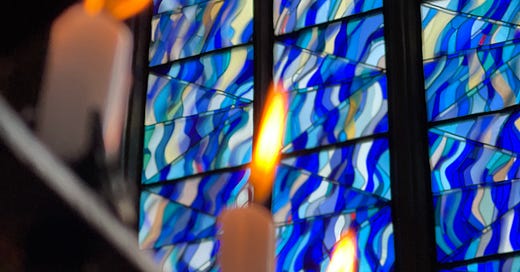Yom Kippur (Yizkor) - In Their Merit
The foundation of prayer is zechut Avot - the merit of our righteous ancestors. (In memory of Hersh Waisbord z'l)
The text below is the transcript of the sermon delivered on Yom Kippur preceding the Yizkor services at Mekor Habracha.
On Yom Kippur this year, our community feels a palpable sense of loss because this is the first year Hersh Waisbord z’l is not with us to recite the prayer for the 6 million during the Yizkor service. His absence leaves a painful void, but I believe his spirit can and should live on at Mekor Habracha. He truly loved this community, and we loved him back. His perspective on life was deeply inspiring, and our memory of him can help us stay focused on the true meaning of our lives, particularly on this Yom Kippur.
The primacy of Yizkor/Memory has become evident in our Mekor Sunday morning halacha chaburah/group, where we’ve been learning about the Halachot of Tefilla/Prayer. (By the way, everyone is welcome to attend this group in the future, so don't hesitate to get in touch with me, Yankel Cohen, or the shul if you are interested!)
During our learning, we discovered that in a sense, the Shulchan Aruch treats the very first prayer of the Amida, Avot, the blessing of our forefathers, as the most important of all, because if you recite that blessing without proper intent, the entire Amidah is invalid and must be repeated, even if you have proper intent during the remainder of the prayer. In the blessing of Avot, we praise God for being true to our forefathers and pray he will do the same for us, in their merit. It seems strange to attribute such importance to the first blessing when we know the first three blessings of praise are categorized as preparation for the next section of the Amidah: Bakasha/Requests, which the Rambam considers the principal section of the Amida. In other words, according to Rambam, if you didn’t ask for something, you didn’t pray, because asking God for what you need is the essence of prayer. Why then does the Shulchan Aruch state that the Avot blessing is the only one in the Amidah that can prevent you from fulfilling your prayer obligation when lacking the proper intention?
We discovered in our learning about Hilchot tefilla that some sources indicate that the Avot blessing is not simply an introductory blessing; it provides the very foundation for all the prayer that follows.
It’s very common for people to approach davening by saying, I did something meritorious, so You, God, should reward me by granting my prayer. But the Gemara extols the opposite approach, advising us to approach God with humility, like a poor person who has little to offer. So instead of highlighting our own good deeds, it is much more effective to pray in the merit of someone else.
We know that God considers the merit of our ancestors and forefathers when we pray. If you think about it, the merit of our ancestors, such as those who died and suffered al kiddush Hashem (sanctifying God’s name), or those who were spiritually righteous – and the list goes on -- their combined merit is so great, it is probably unlimited. It’s like having a billion-dollar bank account – you can’t spend it all even if you try, so why be hesitant to use it?
Unfortunately, this source of merit remains largely unknown. One possible reason is a common misunderstanding of the Talmud (Shabbat 55a) that says, “tama zechut avot,” “the merit of our forefathers has ended.” However, during our morning Halacha group, we discovered that many commentators give a much more precise interpretation than the literal one. They say that while it’s true that we no longer receive the merit of our ancestors automatically, we will benefit if we explicitly pray with the merit of our ancestors in mind.
If people realized how much more power our prayers would have with the merit of our ancestors in our corner, I think they would be much more intentional in their davening. And I believe that is the essence of Yizkor and the secret formula for prayer on Yom Kippur. Of course, we absolutely cannot address our prayers to our ancestors because we may pray only to God. But just as we do in every Amida, we can beseech God in their merit.
Our shul was very fortunate to have had Hersh in our midst. He once explained to us that one reason he chose to daven at Mekor was because he cherished the opportunity to connect with the younger generation at our shul and witness the continuation of the Jewish people. He was a remarkable individual, and we, the Mekor community who had the privilege of praying alongside him, hope that we are blessed with his merit. We also seek the zechut/merit of our righteous ancestors, many of whom, like Hersh, endured the horrors of anti-Semitism, to stand with us on this critical day. Their experiences were a profound kiddush Hashem (sanctification of God’s name), giving them, and by extension, us, the greatest possible merit. So, in the time we have remaining on this Yom Kippur, we should keep in mind to pray fervently in the merit of Hersh and all our holy ancestors. God willing, those prayers will result in a happy, healthy, and successful year ahead.
Chag sameach. Shana tova. G’mar chatima tova.
Eliezer Hirsch


